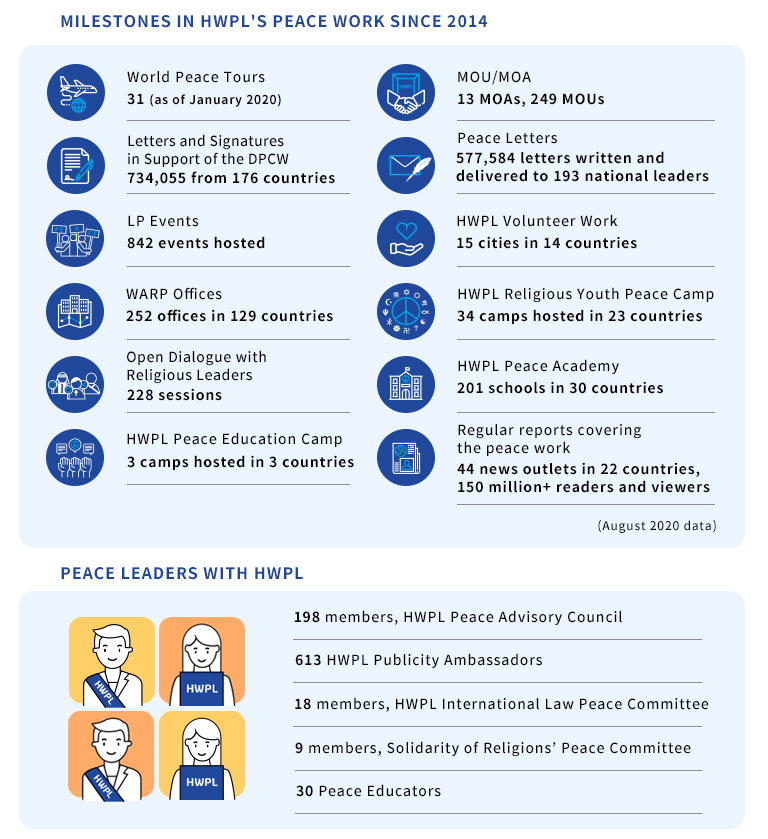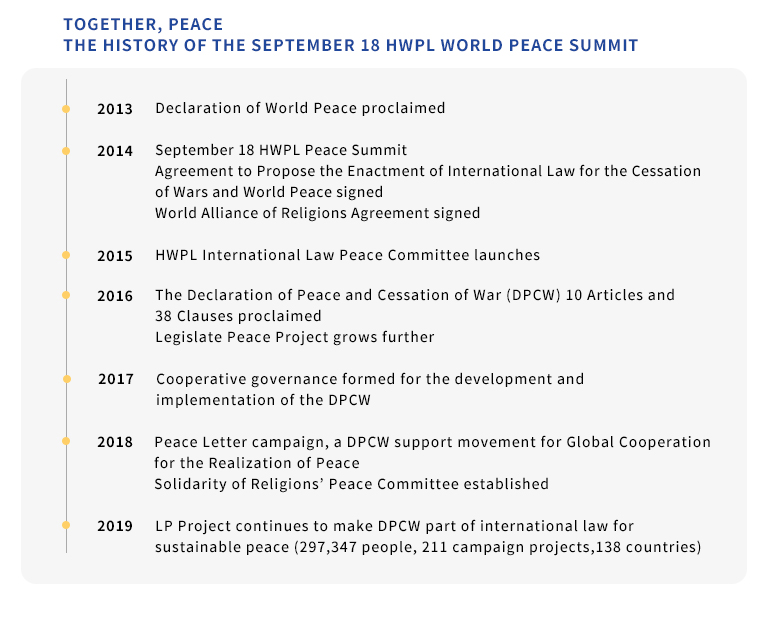Welcoming the 6th Anniversary of the September 18 HWPL World Peace Summit
Peace Messengers — the Unceasing Way Forward for Sustainable Peace

This year marks the 6th anniversary of the September 18 HWPL World Peace Summit. Ordinarily, this week would be a week of a conference hosting lively discussions for peace among peace messengers from around the world. This year, as affliction caused by the COVID-19 pandemic has hit many corners of the globe, peace messengers will continue efforts for sustainable peace in their respective places.
The unforeseen pandemic did not stop HWPL’s work for peace. 1,646 of HWPL members, who are also members of Shincheonji Church of Jesus, volunteered to donate blood plasma toward the development of a cure for COVID-19. 628 people signed up for the first round of donations in July, followed by another 1,018 donations in the second round between August 26 and September 4. 312 members donated blood more than once. During the first quarter of 2020, HWPL members in 14 major cities spanning 13 countries volunteered to clean beaches, run food kitchens, and help orphanages.
A Complete DPCW Curriculum
835 Online Sessions of WARP Office Comparison of Scriptures
3 Webinars on Human Rights of Minority Religions
A New Edition of the Peace Education Textbook with 12 Chapters
Since last year’s 5th anniversary of the HWPL Peace Summit, titled “Legislate Peace” – Implementation of the DPCW for Sustainable Development, peace messengers worldwide scaled up the LP project.
The LP project is carried out in major cities in Europe, Asia, Africa, the US, and Australia. HWPL members are campaigning for the DPCW, and young adults are writing peace letters to global leaders asking for their support of the DPCW.
The Declaration of Peace and Cessation of War (DPCW) also marked a step forward. Last year, HWPL signed a memorandum of agreement with three organizations, including the Coalition of Caribbean Leaders for Peace (CCLP), a group of former presidents of 11 countries in Latin America, agreeing on cooperative peace-building efforts. Pacific island states adopted a Comprehensive Agreement on Advocacy for the DPCW, promising cooperation for advancing the DPCW as a legal instrument. In addition, this year, HWPL completed a curriculum dedicated to teaching law major students the value of peace and human rights instilled in the DPCW. The curriculum is under consultation for plans for future educational programs.

HWPL’s WARP Office Comparison of Scriptures and Peace Education continued online. The pandemic and its ramifications did not stop the religious leaders’ and educators’ passion for achieving peace.
The WARP Office has held 835 sessions globally since January 2020. In August alone, there were 114 sessions, and 153 more sessions in September. The Comparison of Scriptures also delves into the challenges the world faces amid the spread of COVID-19, social issues arising from it including human rights, discrimination against minority religious groups, and how religious leaders can fulfill their roles and help the fight against COVID-19. To build grounds for a more active search for solutions to those issues, HWPL hosted three webinars, and 249 participants attended from eight religious groups.
HWPL’s Department of Peace Education rendered a new edition of its Peace Education textbooks. The textbook for grades 7-9 has 12 chapters and is ready for classrooms and educational programs internationally. Online educational content is also underway. Meanwhile, the Department of Peace Education is working with UNESCO and many other international organizations for education to promote the Peace Education program and invite education ministries to adopt it as a requirement.
With such progress, HWPL is set to host a session to discuss the coming year with leading members in respective fields and departments.
September 18th HWPL World Peace Summit – Looking Back on Our Path Since the First in 2014
Since the signing of two key agreements at the HWPL World Peace Summit in 2014, the Agreement to Propose the Enactment of International Law for the Cessation of Wars and World Peace and the World Alliance of Religions Agreement, HWPL World Peace Summits have been an environment where leaders in world politics, religions, journalism, youth groups, women’s groups, and other fields come together to discuss peace under the slogan “Everyone Together as a Peace Messenger.”
In 2015, the International Law Peace Committee was established. After the DPCW was announced in 2016, the Legislate Peace (LP) Project rolled out as a global movement. Based on such progress, peace messengers established collaborative governance for the development and implementation of the DPCW in 2017. 2018 was the year of cooperation and collaboration for the realization of peace as HWPL members urged leaders to support the DPCW through the Peace Letter Campaign. The same year, the Solidarity of Religions’ Peace Committee launched and pledged to pave the way for peace as leaders of faith.

2019’s “Legislate Peace” – Implementation of the DPCW for Sustainable Development, brought the LP project’s global expansion. The LP project is a peace project that supports the DPCW, a key element of HWPL’s work for peace. It promotes the 10 articles and 38 clauses of the DPCW to build them into the fiber of our societies as the universal principle and value set that encompasses civil society and international relations. Currently, 300,000 citizens in 138 countries are participating in the LP project.
Participants of the World Peace Summit, global leaders and citizens alike, share a common vision of achieving sustainable peace in this generation’s time and letting it take root. Every year, they have built platforms to put their vision into action. That is why the HWPL World Peace Summit is a place of broad networking and the brewery of many meaningful peace collaborations.
In 2020, on the 6th anniversary of the HWPL World Peace Summit, we are charging through difficult times of the COVID-19 pandemic that no one could have predicted. The pandemic has cost us our health, our beloved friends and family, and our normalcy while many of us are fighting the disease in sickness even at this moment. Some compare it to the World Wars. Some say our lives will never be the same again.
However, there is one thing that no pandemic could ever change. It is the fact that global peace needs our shared efforts — the concerted will of international politics, religions, journalism, youths, women, and education need to come together to achieve peace. COVID-19 reminded us how closely related the world is and that no one country can be completely isolated or separate from others. When Peace Messengers do their part in their respective places, we believe we will have a firm stand that is ever more solid to bring and keep peace even after the fight against COVID-19.













